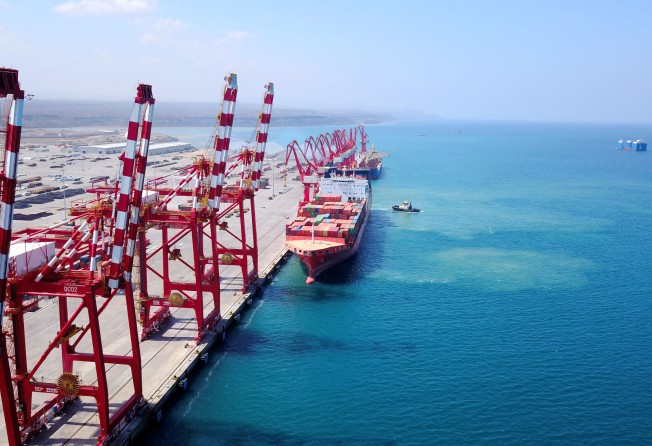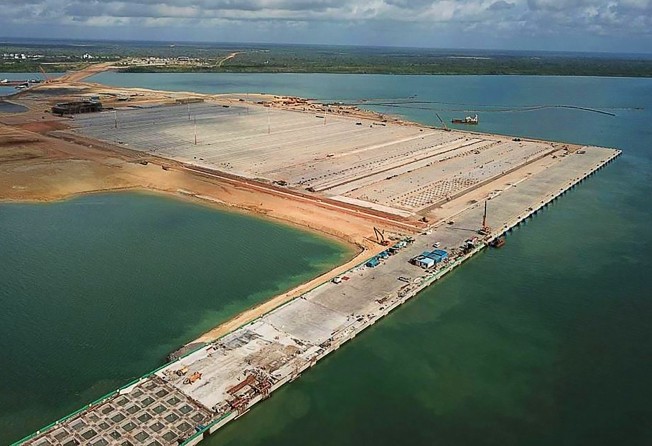
China looks to recreate ancient Silk Road with network of African ports
- Latest addition is a port on the Kenyan island of Lamu, which is set to go into operation in June
- US$5 billion project is part of a US$25 billion infrastructure project to link Kenya with Ethiopia, Uganda and South Sudan

A seaport built by a Chinese company on the Kenyan island of Lamu will go into operation in June as Beijing aims to recreate an ancient Silk Road more than 600 years after Ming dynasty admiral Zheng He visited the area.
According to historians, Zheng’s fleet paid four visits to the Kenyan coast, starting at the town of Malindi in 1418. Centuries later, China is trying to connect this history with several projects in Africa.
The Kenya Ports Authority (KPA) said China Communications Construction Company had completed construction of the first three berths at Lamu port, which is set to become a cargo transshipment hub for containers and oil cargo. The deepwater facility will be capable of handling large sea vessels and will complement Kenya’s main port in Mombasa.
The US$5 billion project is part of a broader US$25 billion infrastructure scheme – the Lamu Port South Sudan Ethiopia Transport (Lapsset) Corridor – which will link Kenya with Ethiopia, Uganda and South Sudan.
Ports operator China Merchants Group (CMG) has made massive investments and signed concessions in Djibouti, Nigeria and Togo, according to The Economist Intelligence Unit. In December, it signed a US$350 million investment deal with state-owned company Great Horn Investment Holding, paving the way for a revamp of the Port of Djibouti into an international logistics and business hub. The US$3 billion project is to be modelled on the port of Shekou in the south China city of Shenzhen that is integrated with a free-trade zone and business centre.
CMG’s investment in the Djibouti port came soon after its US$590m investment in the nearby Doraleh Multipurpose Port and US$3.5 billion in the Djibouti International Free Trade Zone.

But CMG’s presence in the country has not been without controversy. It was sold a stake in the Doraleh container terminal after the Djiboutian government in 2018 seized control of the terminal and transferred concession staff and assets to Societe de Gestion du Terminal, a public company set up to manage the terminal.
Dubai-based DP World, which had operated the terminal, challenged the move in courts in Hong Kong and London – a legal dispute that is ongoing – claiming it was forced out to allow CMG to take over.
Analysts at The Economist Intelligence Unit said “the investments (including a railway to Ethiopia and a Chinese naval base) are not surprising, given Djibouti’s importance as a transshipment hub on the BRI-linked Maritime Silk Road, as well as its potential as a commercial hub for access to other parts of Africa, and its strategic location as a security node for busy shipping lanes passing through the Gulf of Aden and the Red Sea”.
The analysts listed other ongoing or recently completed port development projects involving Chinese finance and construction linked to the Belt and Road Initiative, including major seaports at Abidjan in the Ivory Coast, Tema in Ghana, Lekki in Nigeria, Kribi in Cameroon, Dar es Salaam in Tanzania, Mombasa in Kenya, and Abukir, Alexandria and El Dekheila in Egypt.
A study by the Centre for Strategic and International Studies in 2019 identified 46 sub-Saharan African ports with financial, construction, or operational involvement by Chinese entities. It said that “forming the backbone of China’s ‘Maritime Silk Road’, investments in African ports provide a gateway to the region’s trade and economic development, empower China with political leverage and clout on the continent, and provide a foothold for People’s Liberation Army Navy activities”.
China set up a military base in Djibouti in 2017. Djibouti also hosts US, French and Japanese bases.
Yun Sun, director of the China programme at the Stimson Centre in Washington, said China saw ports as essential to its economic blueprint in the near term and the outreach of its strategic influence in the long run.
“As China aims to become a global power, with a global presence, port facilities that China could trust and access without impediments are indispensable. From a military perspective, this is a foundation for power projection capability,” she said.
David Shinn, a professor at George Washington University’s Elliott School of International Affairs, said the financing, construction, equity investment in, and management of ports was a way to make money for Chinese companies and gain economic and security influence.
In Africa, the list of such ports was long and increasingly involved equity investments and management by a Chinese company, he said.
“This should make it easier for PLA Navy vessels to visit these ports and could lead in some cases to dual use by it. In recent years, there has been a significant increase in PLA Navy calls at African ports. I believe this investment is not only paying off for China, but is a major component of its global security strategy.”
Tim Zajontz, a research fellow at the African Governance and Space project at the University of Edinburgh, said Chinese investments in overseas ports played a crucial role in its foreign trade policy, as they facilitated China-oriented value chains and growth.
Ports like the ones in Gwadar, Hambantota, Djibouti and Piraeus were crucial logistics hubs to facilitate trade and transshipment along the Maritime Silk Road, he said.
But to assume that Chinese port investments formed part of a meticulously planned grand strategy would be misleading, he said.
“Chinese port and logistics companies, such as China Merchants and Cosco Shipping, are global players in a highly competitive market. They operate with a significant degree of independence from Beijing and, like their competitors, first and foremost aim at profit maximisation,” Zajontz said.
The economic sustainability of Africa’s recent port infrastructure boom depended on how African economies recovered from the pandemic-induced recession, he said.
“For major port investments in Africa to pay off, regional infrastructural links and growth in productive sectors are necessary,” he said.